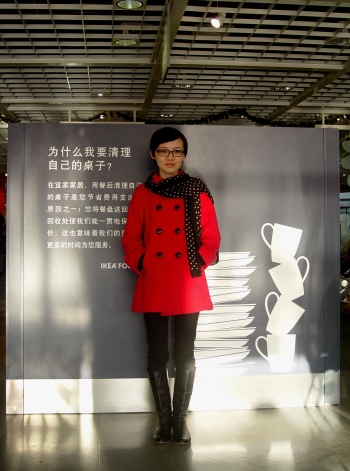
The other day, I visited IKEA for the first time – I had never been in the States or Europe. The deep pink coat and wool polka scarf of this fashion design student had a sixties flair, distinguishing her from the numberless hoards of identical members of the new middle class who crowd IKEA and made me feel very claustrophobic.
There may have been a place with a better light situation to photograph her, but I wanted to include the message that is behind her. IKEA asks customers to bus their own trays, a novel concept in China – even McDonald’s has given up on this. The sign explains that this is to save on costs so that they can keep prices low. In general, IKEA impressed me with the efforts they make to educate customers on European modes of shopping and attitudes toward consumption. They are the only retailer I have seen in China that charges for plastic bags and, everywhere, they highlight the use of recycled materials. In the self-packing area, they ask customers to leave any unused cardboard for others to use. I’ve never been to Walmart, but I suspect they do not go to these lengths, and they probably don’t sell such ingeniously designed knick-knacks.
The IKEA in Beijing is the second largest in the world after the one in Stockholm. Being half Swedish, I was quite proud to see how crowded it was and the cleverness of everything. It was also nice to have Swedish meatballs, layer cakes, and sparkling water in the cafeteria. Of course, IKEA is no longer Swedish, and in fact IKEA doesn’t even seem to be a company, as this economist article explains. The store does maintain its Swedish feel though, and it is great to see it in China.
Europeans might have an easier time exporting their eco-friendly mentality to China than to America. A recent survey revealed that around 60% of Americans see global warming as a serious problem while nearly 80% of Chinese do. The number must be 100% in the Bay Area, but it’s not surprising Americans are less worried when you consider that most of them live in places where pollution is barely noticeable. Also, we tend to export our dirtiest industries to other countries. Global warming and pollution are not the same, but when you live in a smaller environment that is visibly deteriorating and warming due to human activity, year after year, it is easier to accept the warnings of scientists regarding the worldwide situation.
Comments are closed.